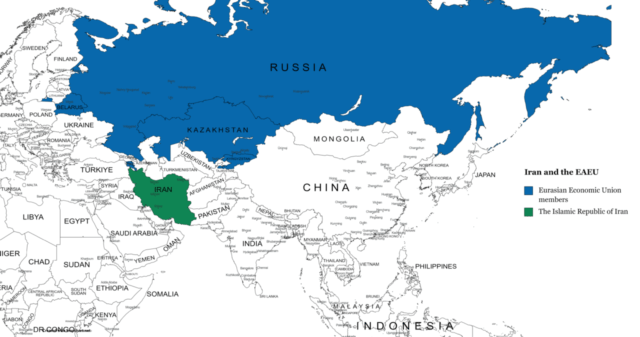Iran and the Eurasian Economic Union signed an agreement on a Free Trade Zone

Persian Files ISSN 2975-0598 Volume 11 Issue 1
Author: Silvia Boltuc
The agreement on creating a free trade zone between Iran and the Eurasian Economic Union stressed the rising diplomatic and economic efforts that Tehran and Russia are sustaining to counter Western sanctions and find alternative solutions for their economies and import-export activities.
- The free trade zone agreement between Iran and the Eurasian Economic Union highlighted Tehran and Moscow’s desire to contrast Western sanctions and economic pressure and extend their cooperation to other post-Soviet republics.
- The free trade zone will offer opportunities for Iranian and EAEU companies and might attract the interests of other foreign investors since the two markets represent more than 272 million customers.
- Iran-Russia economic partnership in the framework of the EAEU confirms Tehran-Moscow’s cooperation in different fields, especially logistics and trade turnover.
Background
According to the Iranian media agency IRNA, on January 19th, 2022, the Islamic Republic of Iran and the Eurasian Economic Union (EAEU) signed an agreement to establish a free trade zone following the meeting of the delegations of the two sides.
Iran’s Deputy Minister of Industry, Mine and Trade and Head of the Trade Promotion Organisation (TPO) of the Islamic Republic of Iran, Alireza Peyman-Pak, said that, as part of the Free Trade Zone agreement, Iran and EAEU approved zero tariffs on 90% of goods. The Free Trade Zone agreement will enter into force by the end of September 2023.
EAEU Trade Minister, Andrey Slepnev, confirmed that Iran is a close partner of the Eurasian Economic Union members in different areas of cooperation. Over the past year, trade turnover between EAEU and Iran increased by 20%.
The Iranian authorities suggested Russia to create a joint institution to combat the Western sanctions imposed against Tehran and Moscow. Furthermore, the Iranian side reported that cooperation with the Russian Federation might be expanded to the banking, energy, and tourism sectors.
Russia, Belarus, Kazakhstan, Armenia, and Kyrgyzstan are EAEU members, while Cuba and Uzbekistan have observer status. EAEU market comprises more than 184 million customers.
How could the free trade zone influence Iranian relations with EAEU members?
Since the beginning of the Ukraine conflict and the imposition of Western sanctions against Moscow, Iran and Russia have discussed opportunities to improve and expand their cooperation.
The Free Trade Zone agreement might support the Iranian and Russian economies and extend economic cooperation with the other EAEU member states. The Free Trade Zone demonstrates that Russia is working on alternative solutions to counter Western sanctions by shifting its attention to the East and boosting its diplomatic and economic efforts in Eurasia, thanks to the support of the Islamic Republic of Iran.
Apart from Iran, also the United Arab Emirates suggested Russia to create a Free Trade Zone with the EAEU, and Thailand also announced a similar initiative. The Free Trade Zone might boost trade volume between EAEU members and foreign actors and circumvent Western sanctions against Tehran and Moscow.
While Tehran is facing internal protests which have attracted international media attention, Iran continues to promote its foreign policy and economic strategy in the Eurasian geopolitical chessboard by expanding economic ties and reaching agreements with regional organisations. Indeed, in September 2022, Iran signed a memorandum of commitment for its permanent membership in the Shanghai Cooperation Organisation, enhancing its role in the Eurasian chessboard and strengthening the Moscow-Beijing-Tehran axis.
Even though, in the last few days, Iran stated that it does not recognise Russia’s annexation of Crimea, Donetsk, and Luhansk region, the Islamic Republic of Iran remains one of the closest Kremlin’s strategic partners. Indeed, Iran is of great importance to Russia due to its natural resources and excellent geographical position that plays the role of a bridge between Asia and Europe.
By establishing a free trade zone with the EAEU, Iran is cementing its relations with Russia and Central Asian republics and Armenia. Especially regarding neighbouring Armenia, the free trade zone agreement might increase the Iranian-Armenian economic partnership, strengthen Tehran’s position in the Caucasus, and counter the rising Turkish and Azeri role in the region since the 2020 Nagorno-Karabakh Conflict.
Do you like SpecialEurasia reports and analyses? Has our groundbreaking research empowered you or your team? Now is your chance to be a part of our mission! Join us in advancing independent reporting and unlocking the secrets of Eurasia’s complex geopolitical landscape. Whether through a one-time contribution or a monthly/yearly donation, your support will fuel our relentless pursuit of knowledge and understanding. Together, let’s pave the way for a brighter future. DONATE NOW and secure your place in shaping the geopolitical narrative.
